Easter in Georgia 2026: How to Celebrate it Like a Local
Easter in Georgia, or Aghdgoma (resurrection) in the local language, is one of the most meaningful times to be in the country. It’s not just a religious holiday but a deeply rooted celebration that combines religious rituals, ancient customs, and strong family ties.
If your trip overlaps with the Georgian Easter holidays, it’s an excellent opportunity to witness something truly special.
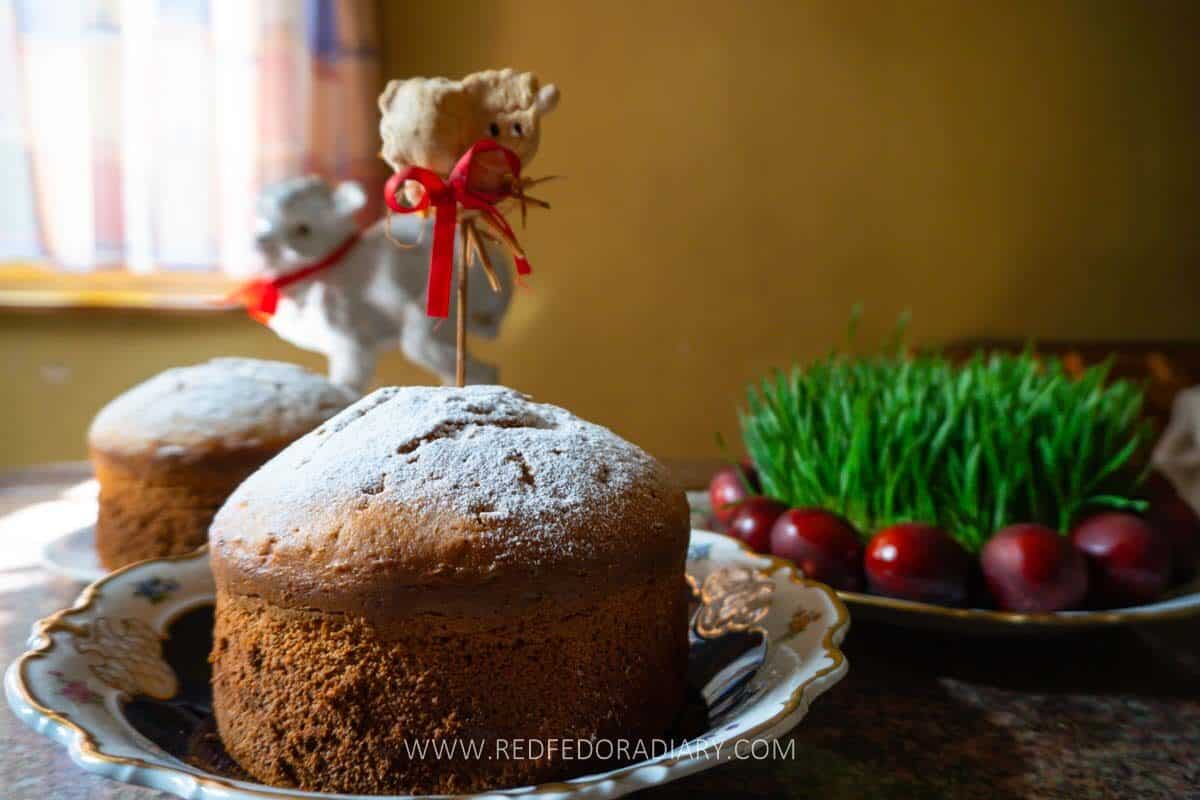
Georgia is an Orthodox Christian country and follows its own (Julian) calendar, which means Easter usually falls on a different date than Catholic countries that follow the Gregorian calendar.
It’s typically anywhere from April 4 to May 8, depending on the year. Like in many Orthodox countries, Easter here is the most important religious event of the year, even more significant than Christmas.
What makes Easter here interesting for visitors is how personal and family-focused the celebrations are. Many locals leave Tbilisi and head to their home regions to be with family.
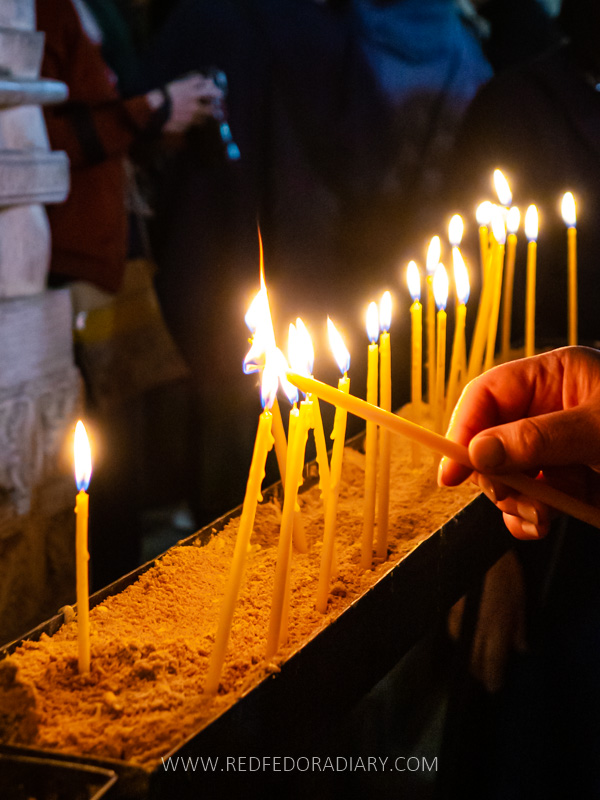
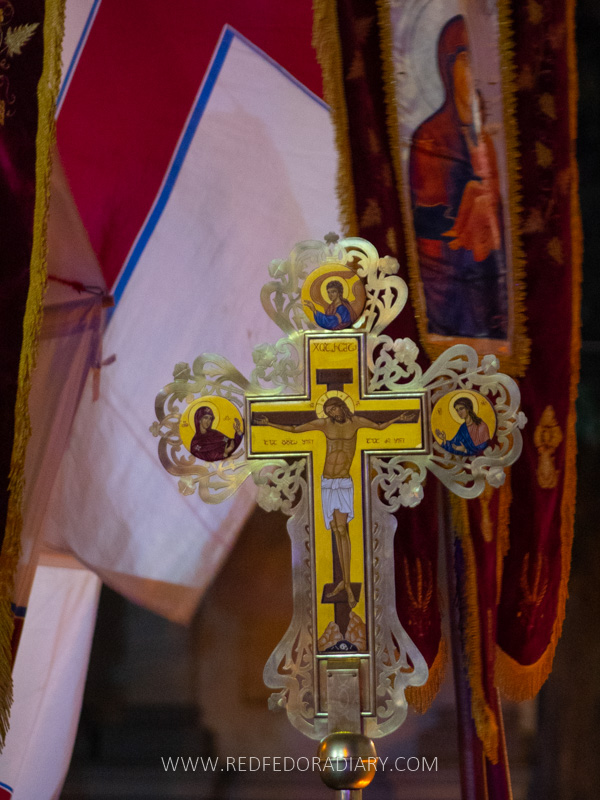
As a result, Tbilisi can feel noticeably quieter. The usual traffic jams are gone, the metro is less crowded, and many small businesses—like bakeries and corner shops—take a few days off.
But that doesn’t mean the whole city shuts down. Most restaurants, cafes, and stores are still open but might have shorter business hours.
The only places that are guaranteed to be close are government offices, museums, banks, and attractions. I provide a more detailed explanation below.
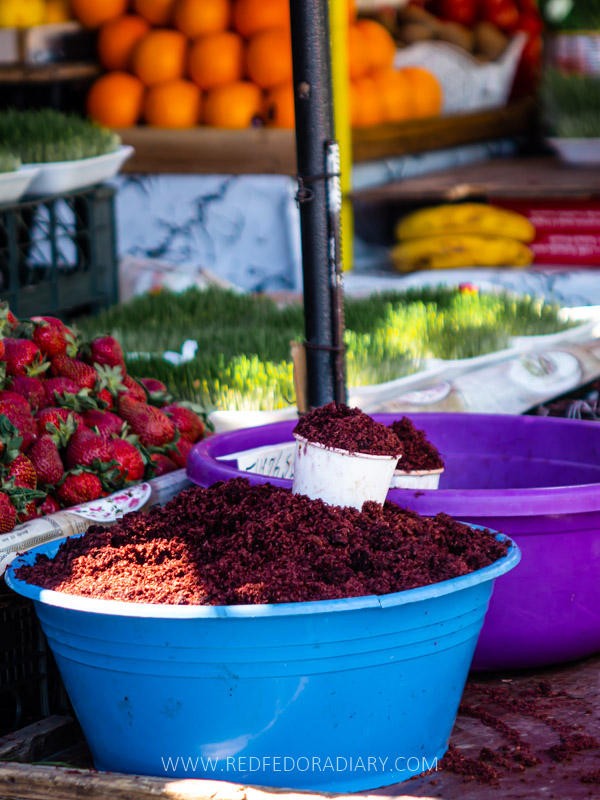
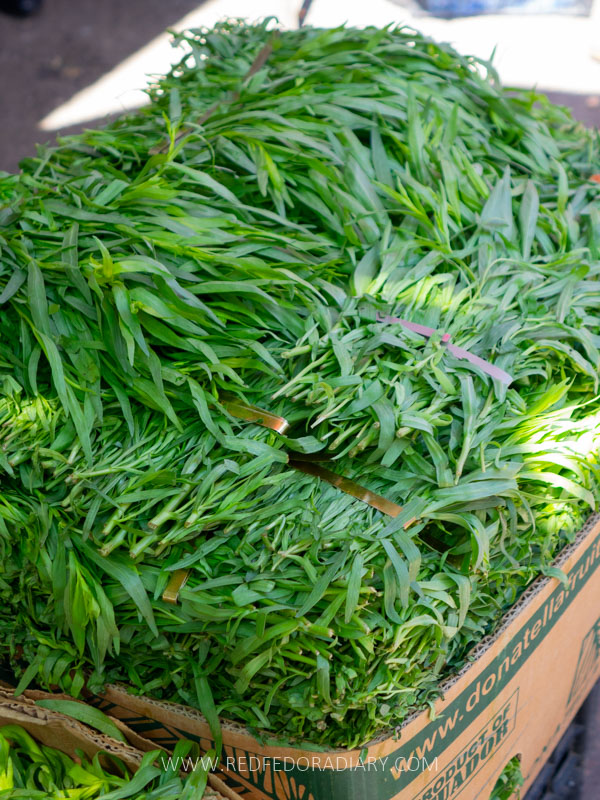
When wandering the streets of Tbilisi or traveling across Georgia, you’ll notice signs of Easter all around you a few weeks ahead of the dates.
Markets and sidestreet stalls are filled with natural dyes and fresh herbs, especially tarragon, and stores and bakeries display the pyramids of Paska cakes.
Although this is a local and family-oriented holiday, there are a few ways to experience Easter in Georgia without feeling like an outsider.
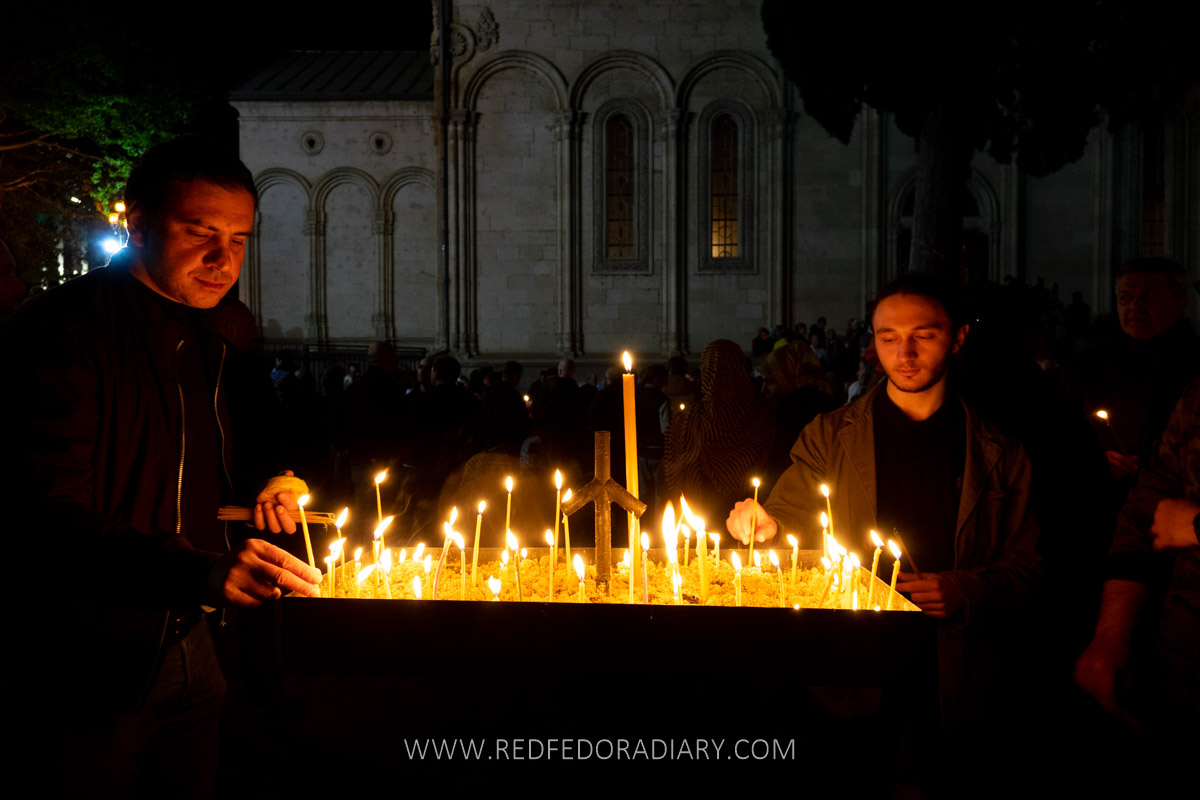
You don’t need to be religious or know much about Orthodox traditions to enjoy Georgian Easter. I’ve broken everything down into bite-sized sections to make it easier to follow.
The post focuses on some practical tips to know before you arrive, what each Easter day means, and how to observe Georgian Easter like a local, with tips on being respectful and informed while you do it.
Disclaimer: Some of the links in this post are affiliate links, which means I may earn a small commission if you buy something through them—at no extra cost to you. It helps support my blog and lets me share real, first-hand travel tips. Learn more
When is Easter in Georgia 2026
Like other Christian countries, Easter dates are movable, and the exact date is typically calculated according to the Spring Equinox (when day and night are equal). Easter in Georgia is the next Sunday following the full moon after the equinox.
Here are the dates for this year’s celebrations:
- April 5 – Bzoba or Palm Sunday
- April 9 – Didi Khutshabati or Maundy Thursday
- April 10 – Tsiteli Paraskevi or Good Friday (Public Holiday)
- April 11 – Holy Saturday (Public Holiday)
- April 12 – Aghdgoma or Easter Sunday (Public Holiday)
- April 13 – Bright Monday (Public Holiday)
Plan Your Trip Like A Pro
Bzoba or Palm Sunday
In Georgia, Palm Sunday is called Bzoba (Day of Boxwood) and marks the first day of the Holy Week. Since palm trees don’t grow here, we use boxwood branches to mark the occasion.
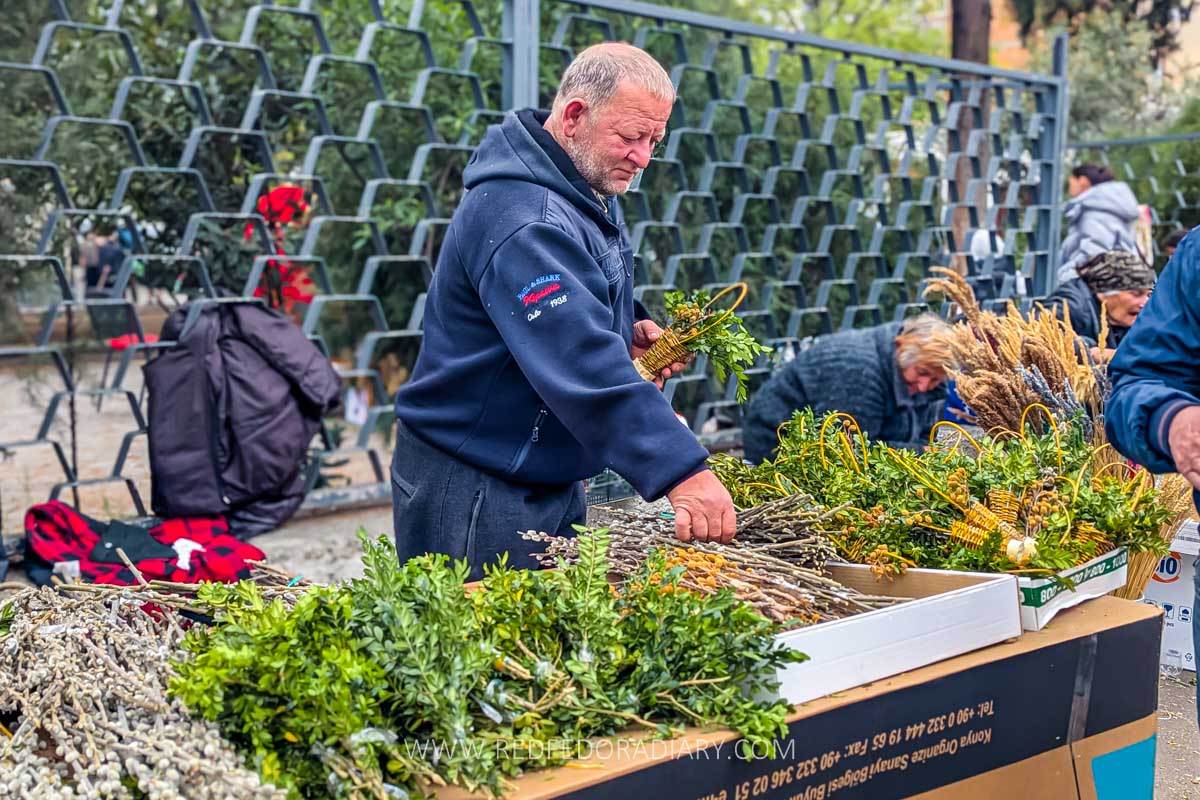
As a side note, this is not only a Georgian custom; other European countries, such as France, Poland, Moldova, Romania, Ukraine, and England, also use boxwood branches.
You’ll see bundles of green branches sold outside churches and in markets nationwide. Some are simple; others are arranged into little woven bunches or placed inside small straw baskets.
Most of these branches are already blessed with the Holy Water by the priest, but some locals bring their own clippings to participate in the blessing at their local church.
Below, I discuss this tradition and what locals usually do on Bzoba.
Didi Khutshabati or Maundy Thursday
Holy Thursday, known in Georgia as Didi Khutshabati or Big Thursday, is one of the most solemn days of the Easter week.
A special ritual called pedilavium—the symbolic washing of the feet—takes place after the morning liturgy at several churches, but the most significant ceremony happens at Sameba (Holy Trinity Cathedral) in Tbilisi.
Here, the Catholicos-Patriarch of Georgia usually performs the ritual by washing the feet of 12 bishops, following the example of Christ washing the feet of his devotees during the Last Supper.
However, this hasn’t happened at Sameba for the past few years.
Tsiteli Paraskevi or Good Friday
Good Friday is called Tsiteli Paraskevi, meaning “Red Friday” – a day when we dye chicken eggs red to symbolize Christ’s resurrection and eternal life.
According to a legend, when St. Mary Magdalene congratulated the Roman Emperor Tiberius on Christ’s resurrection, she gifted him an egg.
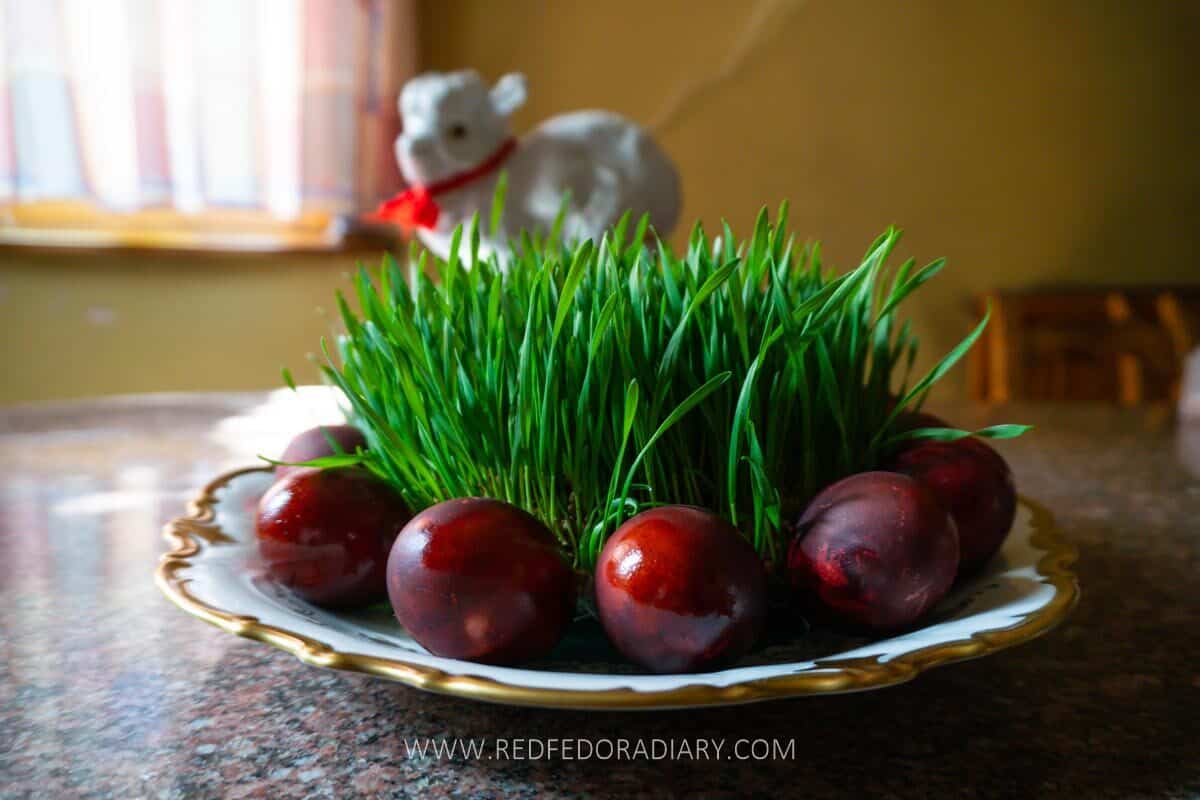
His response to the news was that he’d rather believe this egg to become red than a man coming back from the dead.
Instantly, the egg turned red, giving Christians a tradition of dyeing eggs red ever since.
The main ingredient of the blood-red color dye is the endro (madder root). Therefore, as soon as the Holy Week approaches, enduro, both in root form and powdered, is sold at the markets and street vendors.
Holy Saturday
Holy Saturday is one of Georgia’s most spiritually significant nights. It’s the night of Litonioba, an overnight church service that starts just before midnight and continues into the early hours of Sunday.
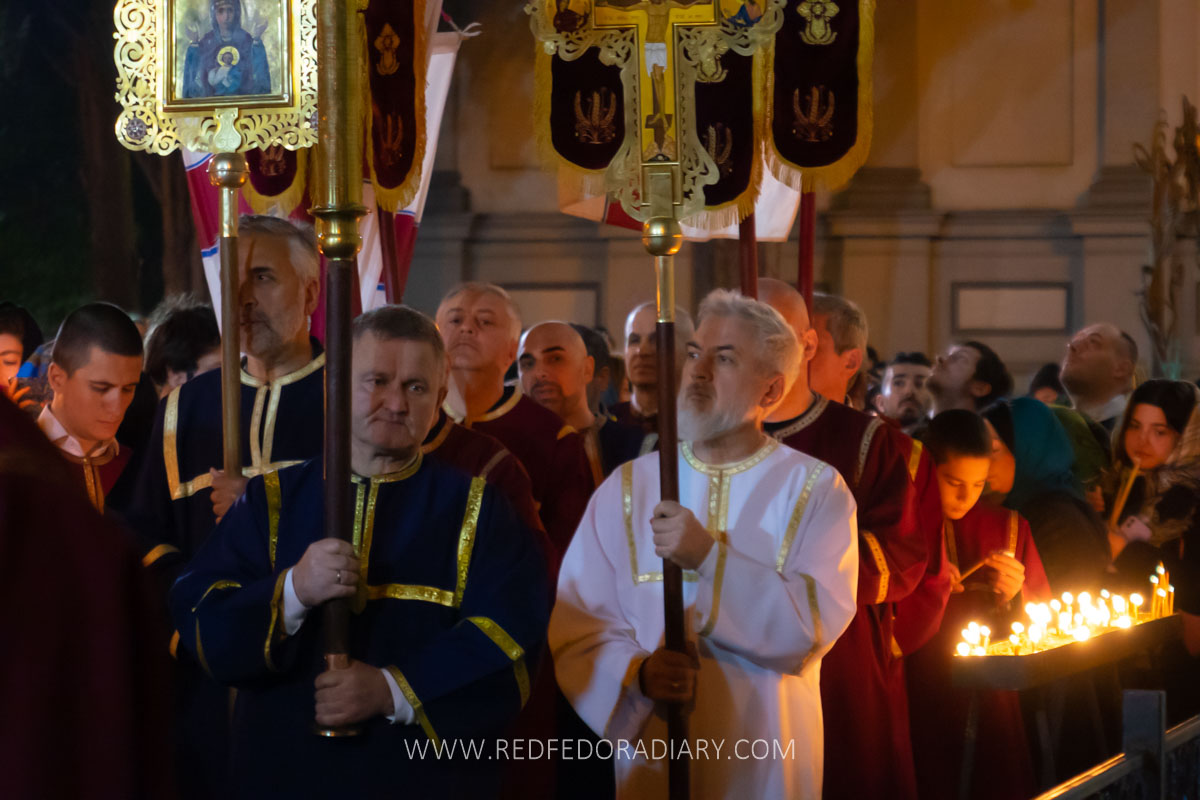
The most special practice on this day is the arrival of the Holy Fire from Jerusalem. After the fire appears at the Church of the Holy Sepulchre, it’s flown from Tel Aviv to Tbilisi on a dedicated flight and distributed to churches nationwide.
Attending Litonioba is one of the easy ways for a visitor to immerse in Georgian Easter traditions and customs, so below, within the section of How to Celebrate in Like a Local, I list a few key churches for you to visit for the mass.
Aghdgoma or Easter Sunday
After staying up for the midnight Litonioba service—or watching it from home—Easter morning is laid back but kicks off with Easter-specific greetings (not Gamarjoba), a few fun traditions, endless snacking on Paska cakes, and a special meal for dinner, all discussed later in the post.
Bright Monday
The day after Easter, Bright Monday, is when families head to cemeteries to visit the graves of loved ones. Because the traffic might be insane, it is common among some families to do this a day earlier on Easter Sunday.
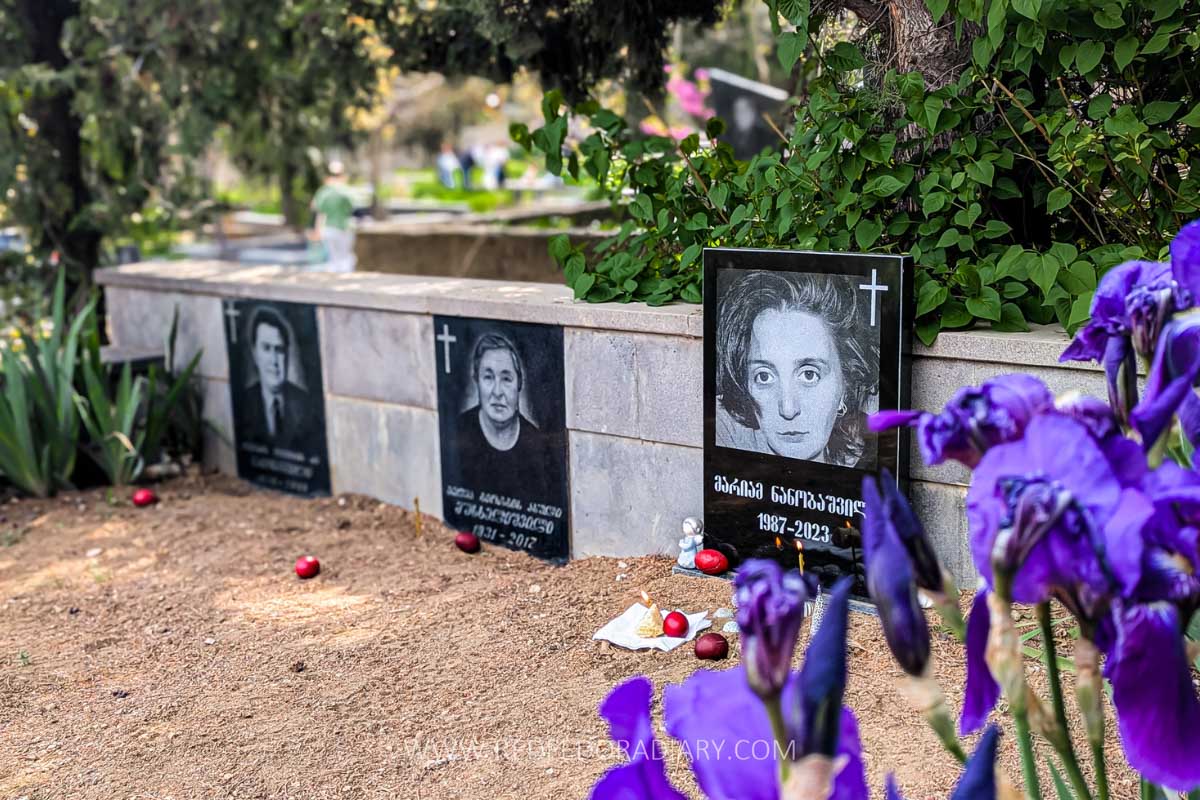
Although you might think it’s a sad or mournful day, it actually isn’t. On the contrary, it gets quite cheerful.
Going to the cemeteries, bringing food, sitting down at the grave, nibbling on Paska and red eggs, drinking one or two (or more) glasses of wine, and chatting are familiar sights on this day.
Later in the post, I talk more about the tradition, give you tips, and explain why we do this the way we do it.
Join a local family and experience Georgian Easter with ease
If you want to celebrate Easter in Georgia the way locals do—surrounded by heartfelt traditions, homemade wine, and a proper countryside feast without stressing out whether things are acceptable or not, my friends and partners at Eat This! Tours organize their annual one-day Easter trip near Gori.
It’s hosted by a small artisan winemaker and their family, who open their doors to a small group for an authentic celebration you won’t find on a typical tour.
Besides understanding and participating in the customs, the tour includes a hands-on cooking demo to prepare Chaqapuli, traditional Easter Georgian Supra, Qvevri opening, and tasting the freshest wine from the latest harvest.
Check their website for more details, and remember to use code RFD5 for 5% OFF at checkout.
Easter tips & essential info to know before your trip
Easter holiday closures
Easter is always a public holiday. Therefore, a common concern is whether businesses close during these dates or not.
With some exceptions, Georgia doesn’t come to a complete standstill during these days. But there are a few things you’d want to consider.
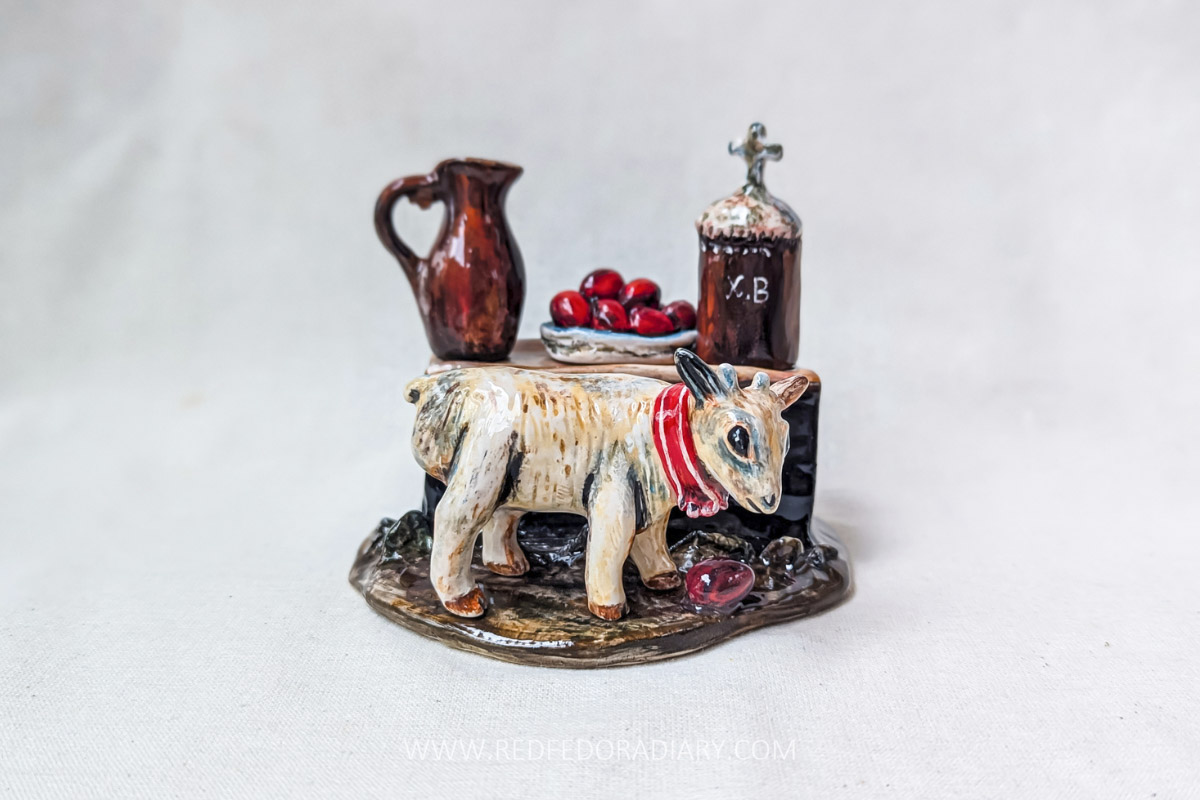
While there are four official national holidays, things generally run as usual. However, in 2024, the rest of the week from Bright Monday to Friday was declared a national holiday too. This hasn’t been announced yet for this year, but I suggest having a Plan B.
National museums, banks, heritage sites, and visitor centers at national parks are closed these days. If the heritage site, like Vardzia, has an active church inside, it will be open on Easter Sunday to host a mass.
On the other hand, Uplistsikhe Cave Town near Gori closes down for Easter Sunday and Bright Monday.
Smaller, family-run businesses and shops may close on Friday, Sunday, and/or Monday. Supermarkets, cafes, and restaurants stay open but might operate on shorter hours. Larger establishments, such as bigger restaurants, open-air bazaars, and pharmacies, remain open.
Public transport availability
Public transport in Tbilisi and other cities continues to operate during the Easter holidays, though there may be some schedule adjustments. Services often run on a reduced timetable during the day but are extended for those heading to church mass.

The metro in Tbilisi typically accommodates late-night churchgoers until 4 am on Easter Sunday free of charge. City buses to cemeteries are also usually free on Easter Sunday and Monday to let locals pay their respects to the dead (more below). However, traffic around these areas is also quite hectic.
The municipal transport in Kutaisi is also usually free on Easter Sunday and Bright Monday. Taxis are available in limited quantities, especially in Tbilisi, so you may need to wait longer when ordering one with the Bolt app.

Trains continue as usual, but intercity marshrutkas (shared minivans) and buses may operate on a reduced schedule. Check timetables beforehand if you’re traveling across Georgia over the Easter weekend. Train tickets to Kutaisi, Zugdidi, or Batumi sell out quite fast.
Alternatively, consider renting a car (I recommend LocalRent) or booking a transfer service like GoTrip for more convenience and added security to get to your destination without disruptions on your trip.
Local tip: Traffic can be insane during Holy Week, especially on Friday, as locals travel out of Tbilisi to visit their towns and villages and return on Bright Monday. The Rikoti Highway (the main east-west route) can get especially overloaded.
Restaurants during the holidays
Dining out during Easter is mainly unaffected as most restaurants remain open, and so do the bars, cafes, and coffee spots.
Alcohol is available everywhere, both in the venues and stores throughout the Holy Week.
Although religious locals fast before Easter, the food menus cater to those who abstain from animal products and those who don’t. Therefore, you won’t have a problem eating out.
Where to celebrate Easter
For those who want to mark Orthodox Easter in Georgia, Tbilisi is a natural choice because of the celebrations, accessibility to transportation, dining out opportunities, and ease of getting Easter-specific produce.
However, other places across the country are also great to be at these days.
Mtskheta, the ancient capital of Georgia and a short ride away from Tbilisi (although you might want to stay overnight) is one option for joining the Liturgy inside the beautiful Svetitskhoveli Cathedral.

Showing up for the church service at Kutaisi’s Bagrati Cathedral or Racha’s Nikortsminda could be pretty memorable, too.
For a unique Easter festivity, Western Georgia’s Guria region offers some of the most distinctive Easter Sunday traditions – Lelo Burti. This 300-year-old ball game, resembling rugby without the rules, occurs late afternoon in the Shukuti village.
You can celebrate Roman Catholic Easter in Georgia
Georgia primarily follows the Orthodox Christian tradition, and Easter is celebrated here according to the Julian calendar.
Although there are similarities with Roman Catholic Easter, church services, rituals, and customs differ.
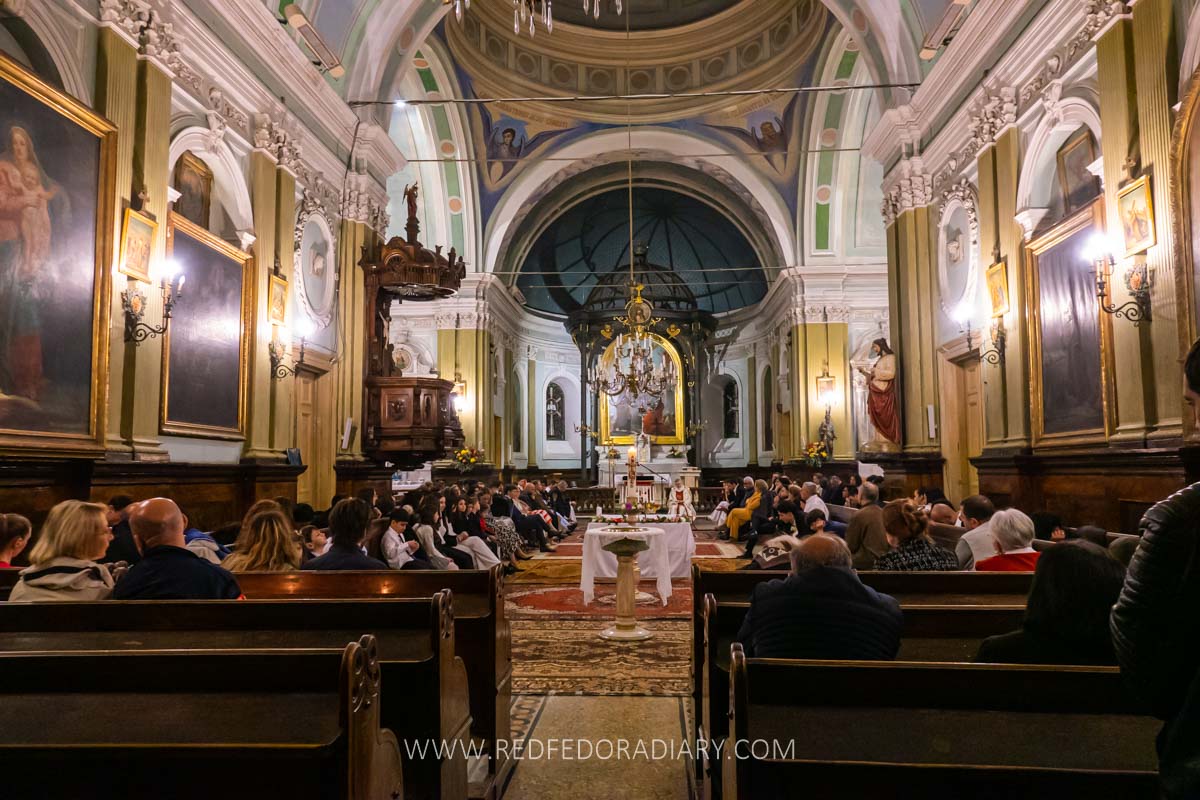
If your trip to Tbilisi and Georgia coincides with Catholic Easter, we have a few Catholic churches where you can attend a service or a mass.
Tbilisi’s St. Peter and Paul Apostles’ Church in Chughureti and near Fabrika Tbilisi is a great option. If traveling across Georgia, visit Batumi’s Church of the Holy Spirit or Kutaisi’s Church of the Immaculate Conception.
How to celebrate Easter in Georgia like a local
Observe a fast before Easter
Many religious Georgias observe a 40-day fast before Easter, refraining from animal products (meat, dairy, eggs, and fish) but continue eating regular meals in typical portions.
Fasting is a regular part of life for devoted Georgians, with four fasting periods throughout the year. Therefore, traditional Georgian cuisine has plenty of vegetarian and plant-based meals and lots of other products catering to those who fast.
Samarkhvo (სამარხვო) is a Georgian word meaning “for fasting” and refers to products that don’t have animal ingredients. You can find cakes, chocolates, cookies, mayonnaise, and other produce labeled as Samarkhvo in various supermarkets, bakeries, and shops.
These products are also great for vegetarians and vegans, but not all of them might cater to your dietary lifestyle, so always check the ingredients.
Grow Easter grass called Jejili
Two to three weeks before Easter Sunday, Georgians grow Jejili – a wheatgrass on plates that symbolizes the new life Jesus gave us with His resurrection.
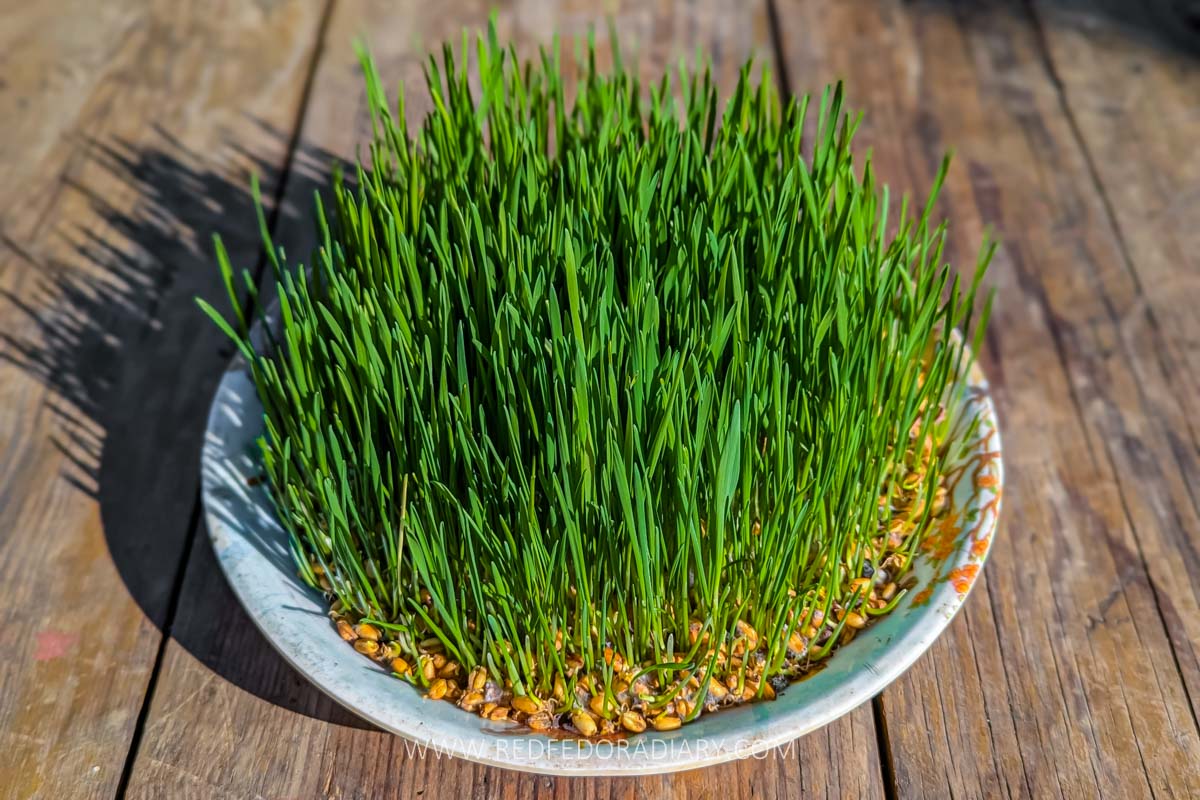
We use it as part of the decorations, either as a stand-alone piece or place blood-red colored eggs around it.
To grow the wheatgrass, we wet cotton pads in water, arrange them on a plate, sprinkle a handful of wheat seeds, and put them near the window to get direct sunlight. It needs anywhere from one week to three weeks to grow.
Don’t worry if you can’t grow it; you can find pre-grown trays in the markets and at street vendors.
Get a blessed Bza on Palm Sunday
On Bzoba or Palm Sunday, Georgians buy fresh Bza (boxwood) branches to return home to display in a vase or near the icons.
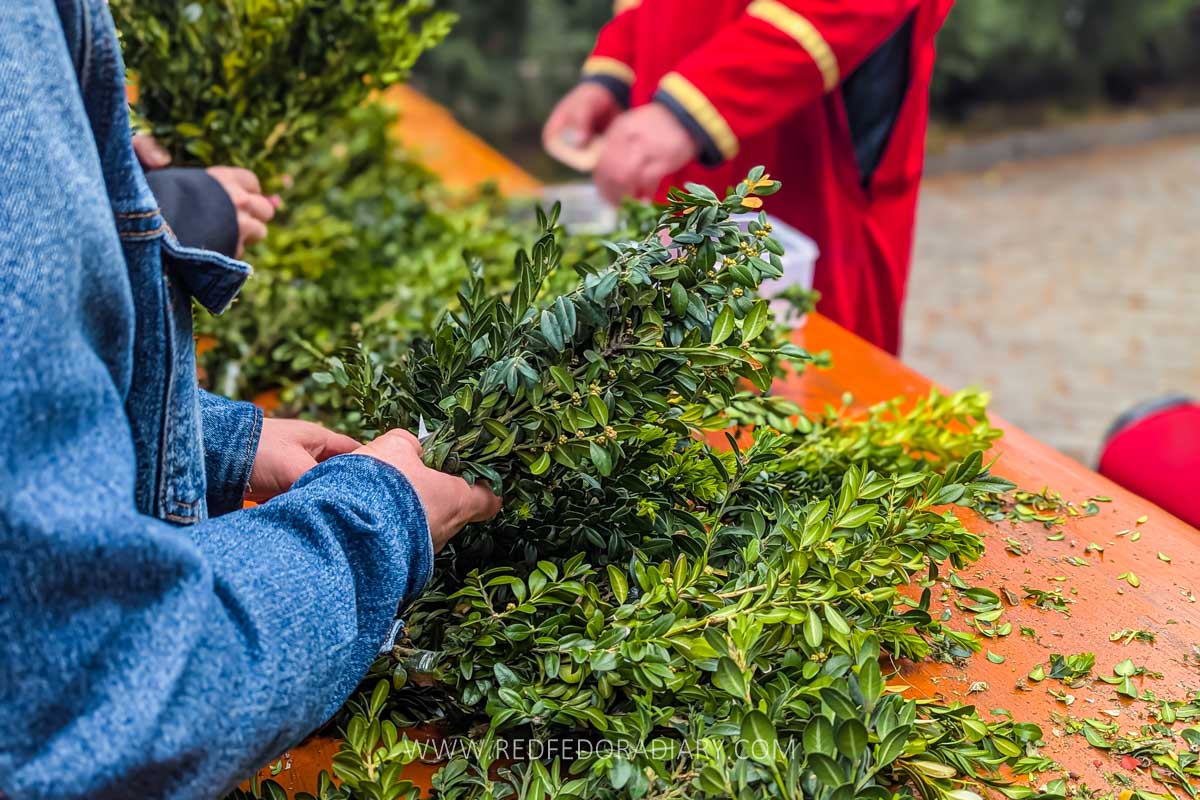
Typically, one family member brings the dry Bza clippings from the previous year to the church courtyard and gets a new, blessed one from the church or nearby street vendors.
Some even like to bring branches in the morning and participate in the priest’s mass blessing of Bza with Holy Water.
Dye eggs in red on Red Friday
As mentioned above, Red Friday, or Tsiteli Paraskevi, is when we dye chicken eggs in a blood-red color before sunset to symbolize the blood of Christ, his rebirth, and eternal life.
Unlike in other Orthodox countries, we don’t decorate eggs with patterns or wax designs—just a bold, uniform red using endro (madder root).
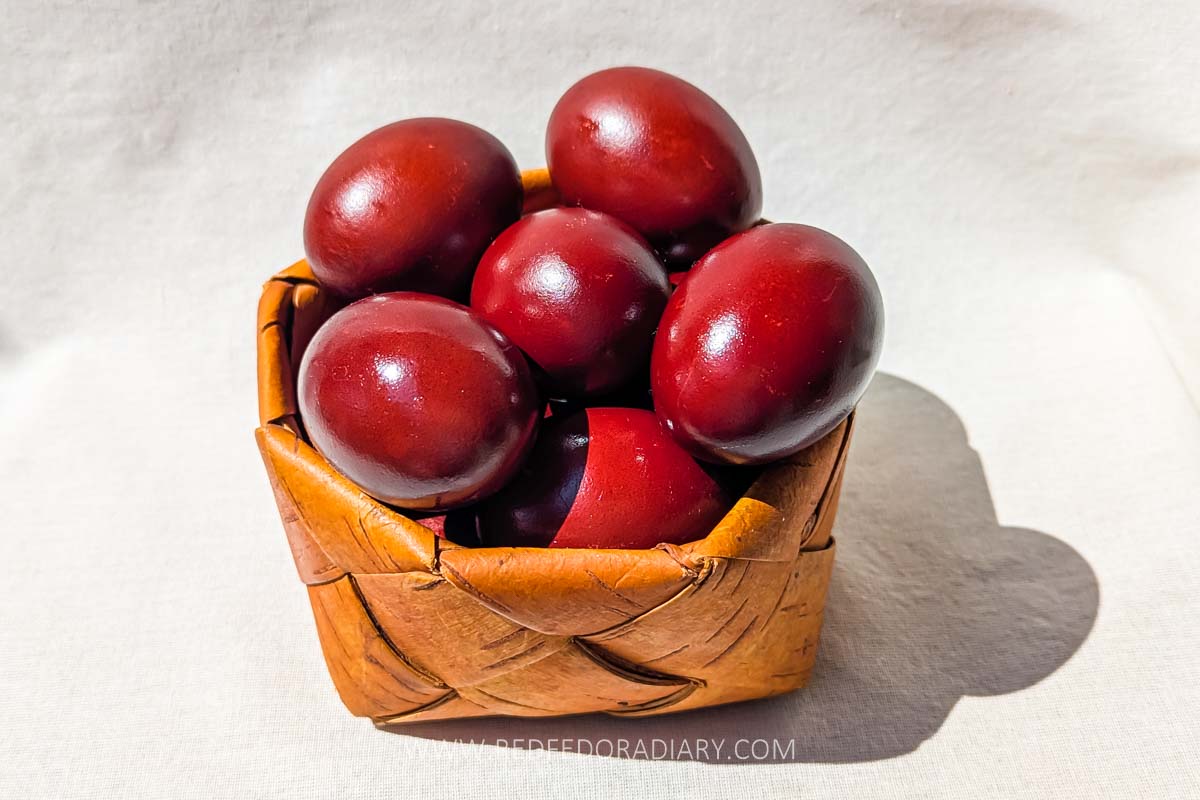
The traditional way of dyeing eggs is with a madder root, but some locals use synthetic food coloring and even dye their eggs in different colors than red. Others might also add red onion peels to intensify the color. Every family has its recipe or a trick for getting bright or dark red colors.
My family follows the tradition seriously and sometimes uses a combination of endro and onion peels. Different-colored eggs are unthinkable!
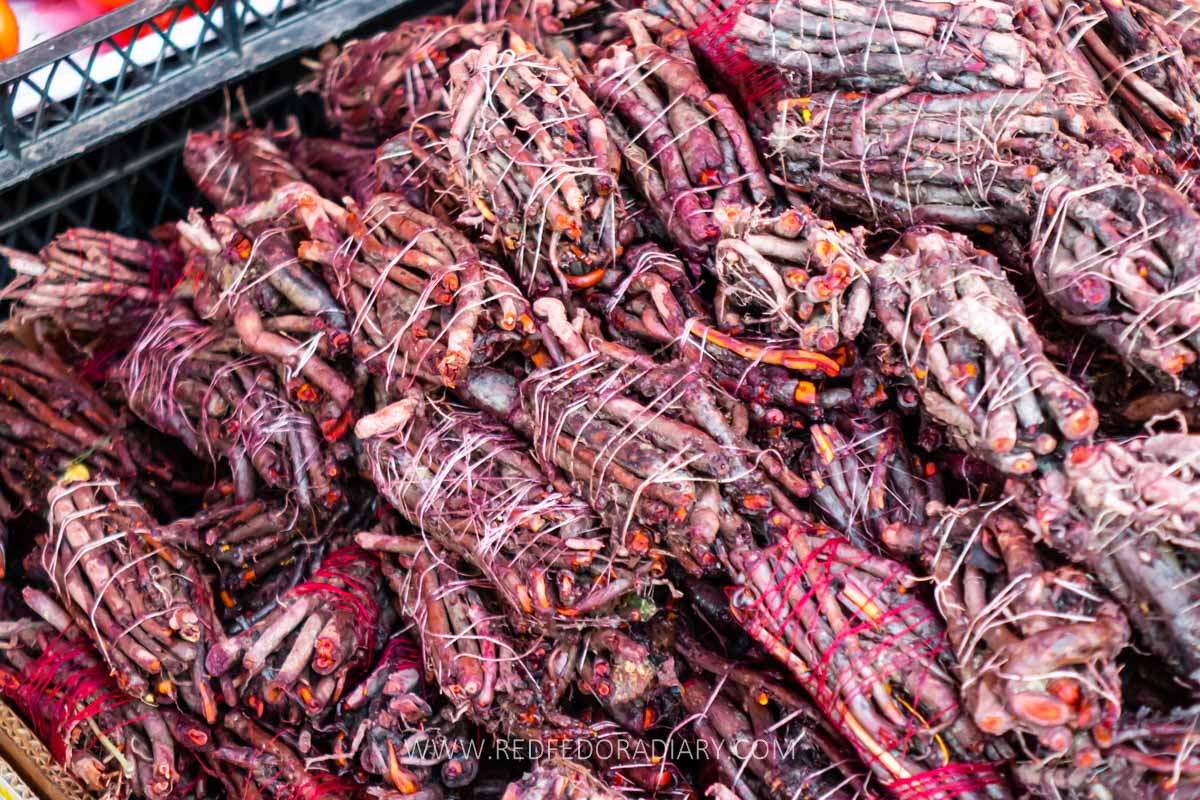
We buy endro in its original form instead of powder and crush them. Do note, though, that some roots or onion peels might be of low quality and may result in a different shade of red. Our eggs turned out more brownish than red once.
If you are short on time or want to have the red eggs as part of your Easter holiday celebration, I’ve seen street vendors throughout Tbilisi selling pre-colored reg eggs.
How my mom dyes eggs
She crushes madder roots, soaks them in water on Thursday, and leaves them overnight. If she has good-colored red onion peels, she’d include them with crushed roots.
On the morning of the Red Friday, she boils the water and lets it cool down. Then, she puts eggs inside so that the water covers them completely. She adds a bit of salt and grape vinegar and puts the pot over the gas again to boil and color the eggs.
When done, we polish these eggs with oiled cotton pads to sparkle and give them a more vibrant color.
Buy Paska – Georgian Easter cake
As the Easter holiday approaches, the “madness” of Georgian Easter cake starts. Georgians absolutely adore their Easter cake. People even buy it as soon as it hits the shelves of various shops and supermarkets weeks before.

These days, my Facebook feed is overcrowded with posts asking for recommendations on which company is the best.
Paska is an Eastern European Easter bread traditionally baked in Eastern Orthodox Christian countries. Georgian Easter cake is a sweet pastry, like a butter cake rather than bread.
It is round and tall and has various decorations on top. It differs in size and height; the inside filling can also vary depending on the country.
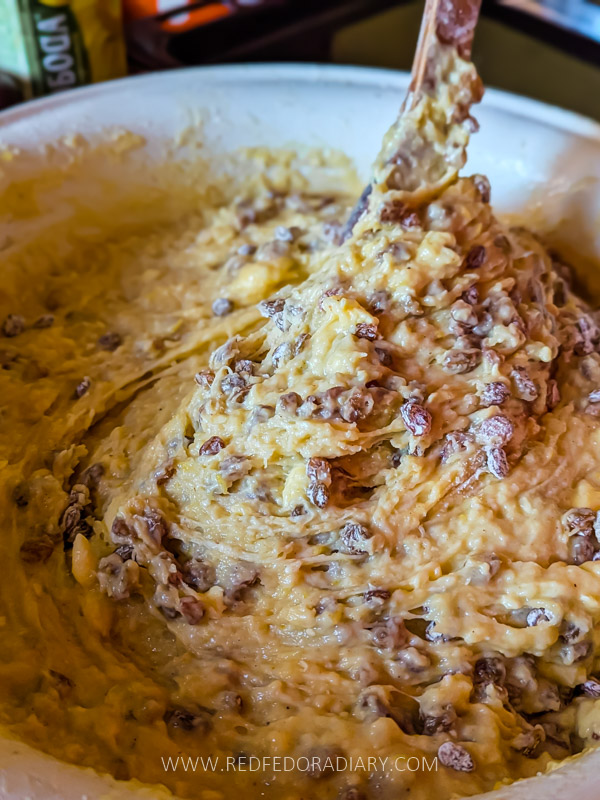
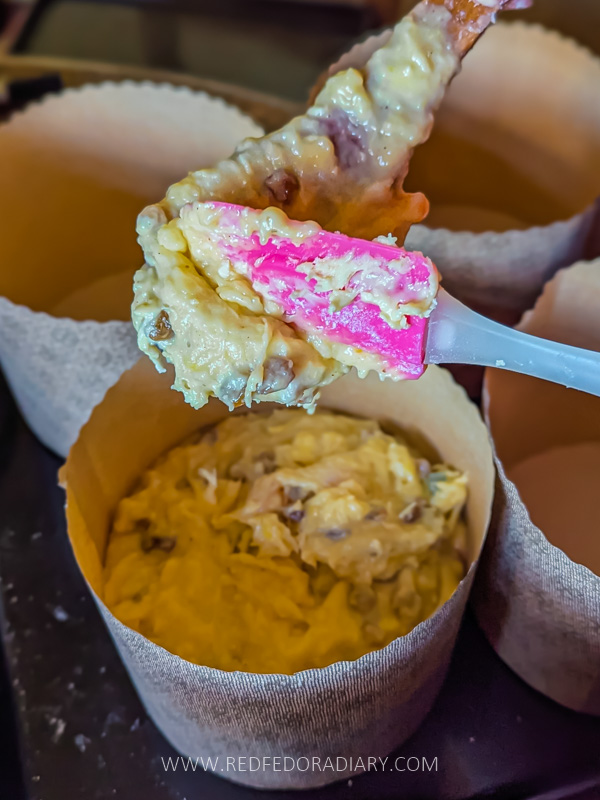
Before Paska became popular in Georgia during the Soviet times, we baked Easter Kada – the sweet bread/pastry stuffed with flour, butter, and sugar. A few Georgian regions, like Samtskhe-Javakheti, still make Easter Kada instead of Paska.
Georgian Easter cake usually has raisins inside, while the top is either sprinkled with powdered sugar or decorated with egg white icing. More modern versions can also have succades or dried fruits. Some Paskas are also made from cottage cheese.
Where to buy Paska in Tbilisi
Getting a Paska is no challenge, as they are everywhere! Both small and big bakeries sell them, as do neighborhood grocery stores and big supermarkets.
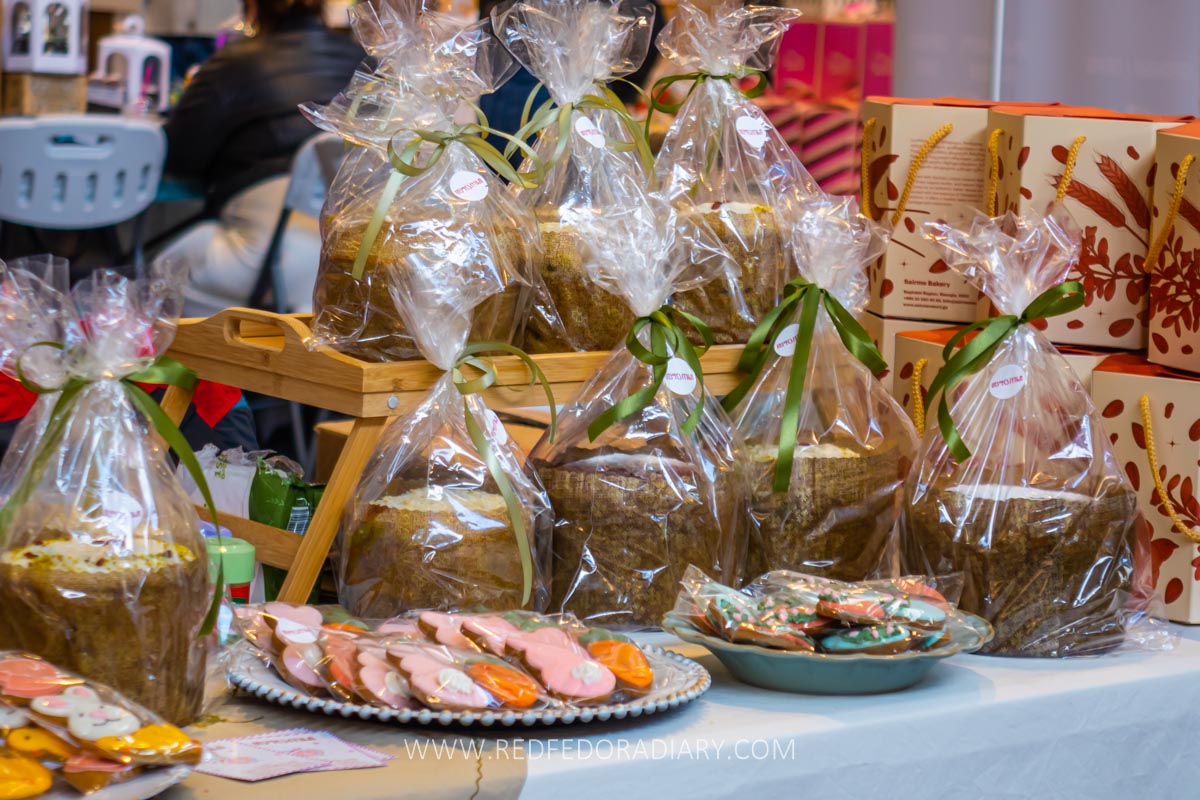
We always bake Paska at home, but a few places are crowd favorites and recommended to me by my friends.
Bazari Orbeliani usually hosts a Paska market a few days before Easter, bringing various artisanal and independent bakers offering ‘homemade’ Paskas.
Here are a few favorite bakeries and cake shops to check out for classic and atypical tasty Paskas:
Attend Litonioba – the church service
The most important part of Easter in Georgia (and elsewhere) is the mysterious arrival of the Holy Fire in Jerusalem one day before Easter Sunday.
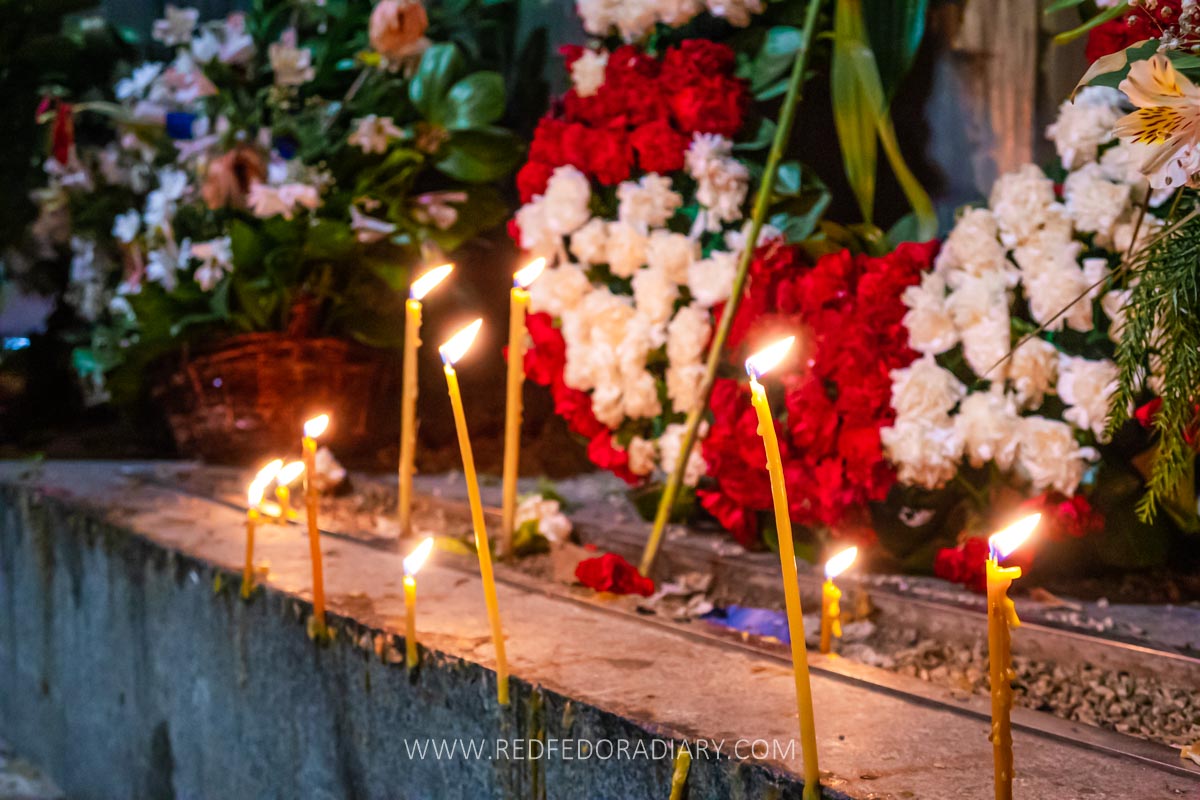
Religious locals go to the church from 11 pm on Saturday to participate in the Easter mass called Litonioba, held in almost every church, big or small, across the country. Every church has its own schedule for the start of the mass.
Attendees listen to the Catholicos-Patriarch and pray while waiting for the delegation to bring the Holy Fire. The whole process lasts a few hours.
Participating in or observing Litonioba is the easiest way for foreigners to mark Easter here. No one will be against it if you stop by any church for the mass, but the Holy Trinity Cathedral in Avlabari is the primary church for the Liturgy.
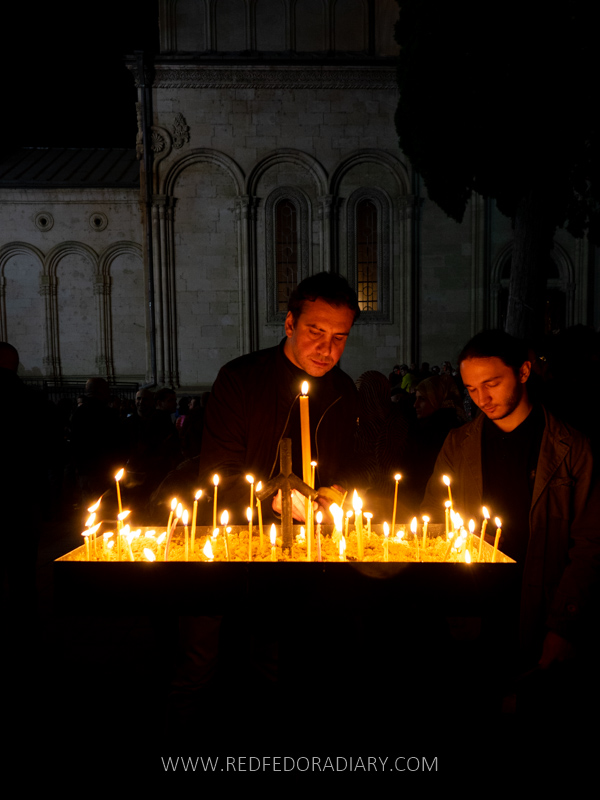
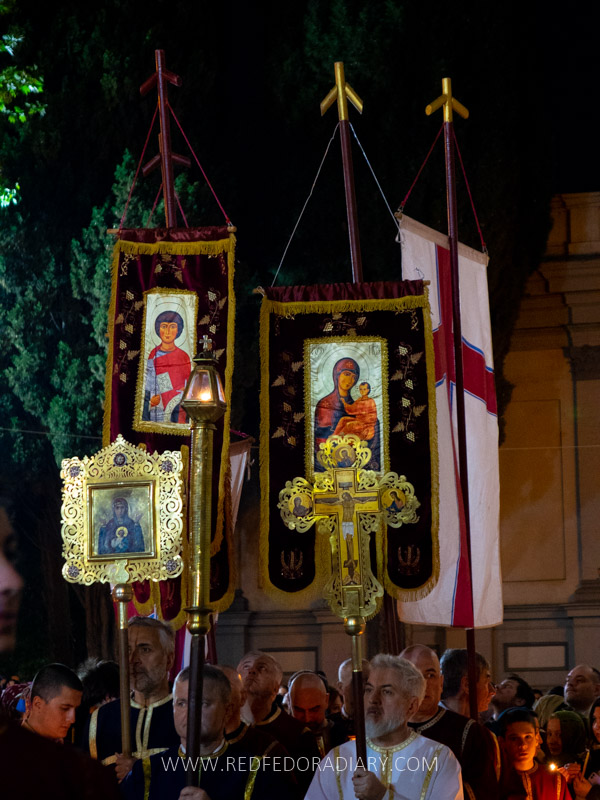
Things to consider during Litonioba
My family is not religious; we rarely join church masses, and I have participated in Litonioba only once. But to keep this blog post updated, I’ve decided to go again this year.
Stay outside: While most people stay inside, a crowd in the churchyard often listens to the service through speakers. Depending on the church and the number of people, it easily gets packed inside, so standing outside gives you more space and makes it easier to leave early if needed.
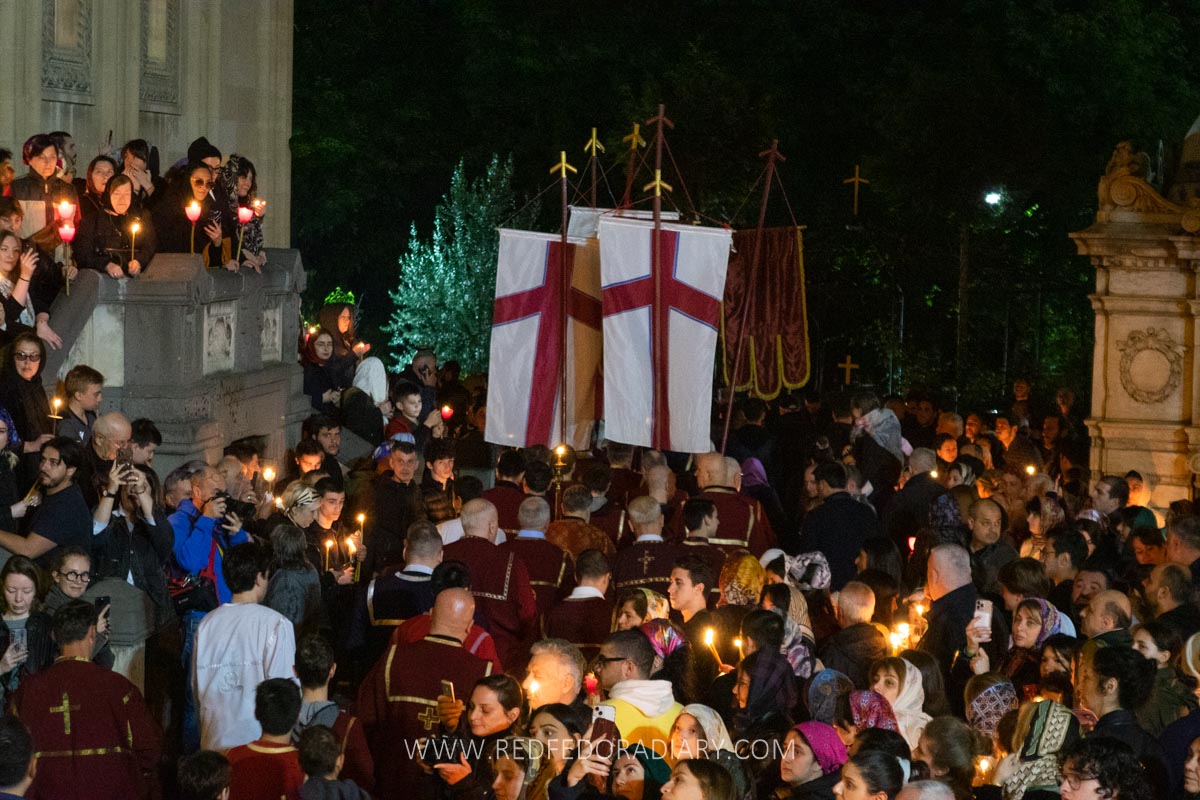
Bring a candle: Lighting candles during the mass is an essential part of the process. Buy them before from the shop at the church and bring them with you. You don’t need to have a lighter. Walking up to a person and asking them to light your candle with theirs is a common behavior.
Dress appropriately: Wear warm clothes as you might be standing outside. Women usually wear long skirts/dresses and cover their heads with a scarf; men typically wear long pants. A more modest color choice is advisable.
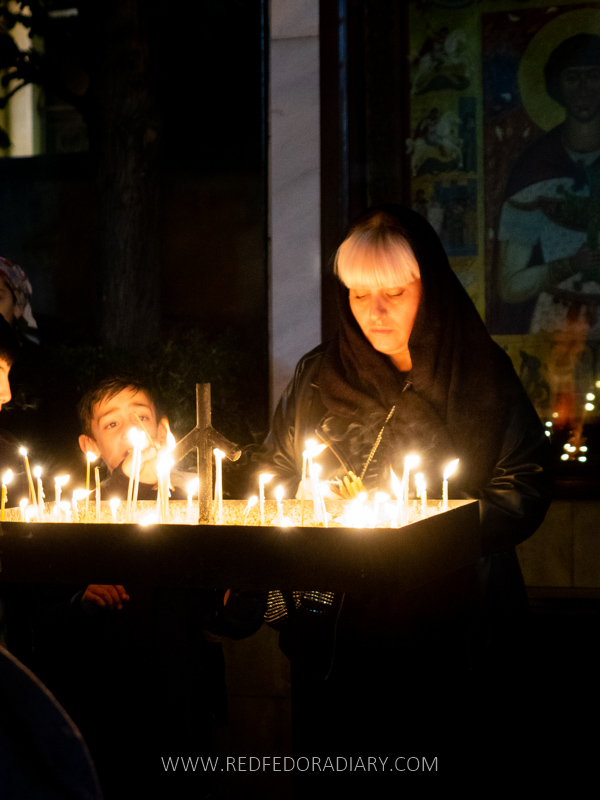
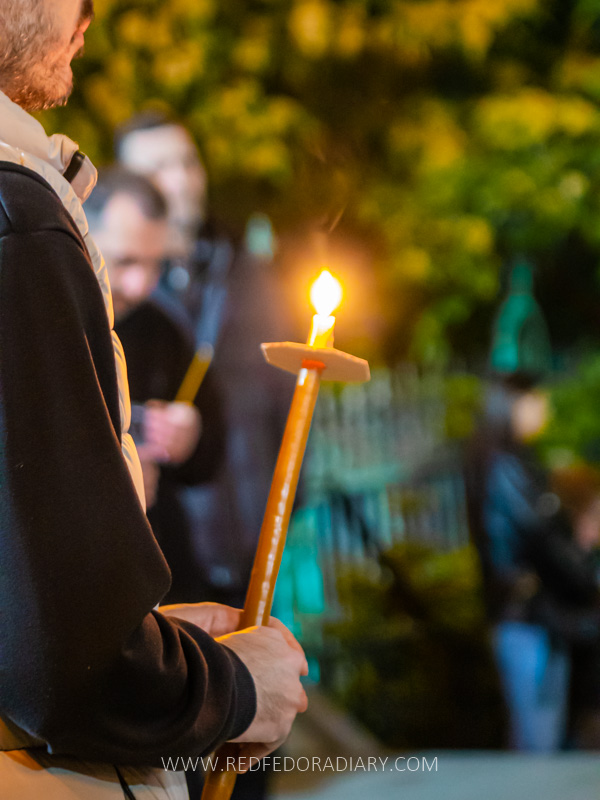
It’s okay to leave early: The service lasts for several hours and finishes anywhere from 2 am to 3 am, depending on the church and the priest.
The mass is in Georgian: Although the service is in the local language, there are familiar liturgical chants that transcend language.
Best churches for Litonioba in Tbilisi
Holy Trinity Cathedral (Sameba in Avlabari) is Georgia’s largest and most prominent church, hosting the grandest Litonioba mass.
St. George English Language Eastern Orthodox Church in Dighomi, quite a bit farther from the center, is a unique option for those who want to participate in Litonioba in English. Check their Facebook page for event details.
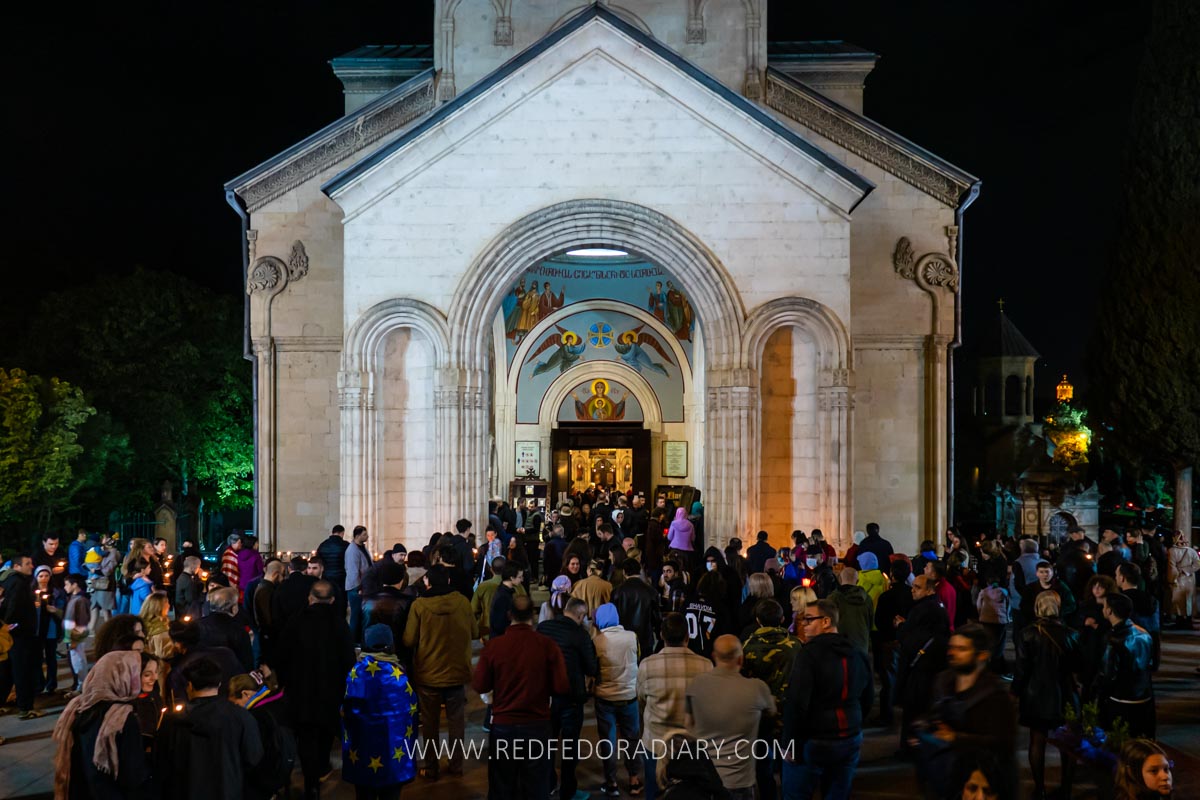
Anchiskhati Basilica in the Old Town is the oldest church in the capital, but due to its small size, expect to stand outside.
Saint Michael Archangel Church in the Chughureti neighborhood is a beautiful small church worth coming to for the service.
Greet people with an Easter greeting on Sunday
On Easter Sunday, Georgians don’t say “Gamarjoba” (Hello) to each other; instead, we congratulate everyone by saying an equivalent of Happy Easter.
If someone says: “Qriste Aghsdga” – Christ has risen!
The response is: “Cheshmaritad Aghsdga! – He has risen indeed!
Crack the red eggs on Easter Sunday
There is no Easter egg hunt in Georgia. Instead, we crack those red-colored eggs first thing in the morning on Sunday.
There’s a whole process involved. First, we choose the strongest egg from the batch by slightly rapping it on our teeth. The clearer the sound, the stronger the egg might be.
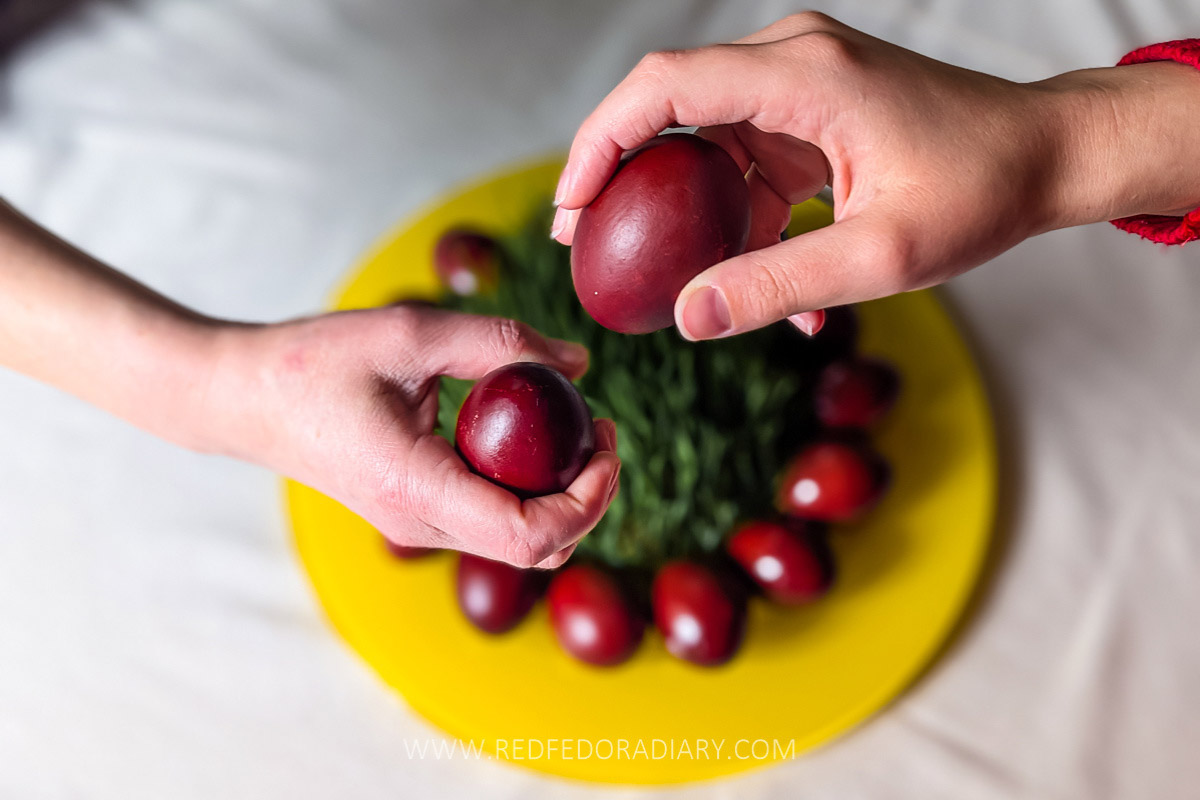
Each family member chooses their egg and starts cracking by tapping on both sides of the opponent’s egg. The pointy part of is called tavi, or ‘head,’ and the other traki, or ‘butt.’ The winner is the one whose egg has no cracks and gets all the broken ones.
As kids, we would take our strongest eggs at school following the Easter holidays and compete with classmates. I don’t think children do this anymore.
Devour Chaqapuli – the prime Easter food
On Sunday, we make a special meal – Chaqapuli – a lamb meat stew infused with green plum (tkemali), white wine, green onions, plenty of fresh herbs, and tarragon.

It’s a must-have Easter food and a seasonal favorite often seen on the menus across Georgia and Tbilisi restaurants during spring. As many locals outgrew eating lamb, many families substituted it with veal, beef, or chicken.
If you are up for cooking one yourself, Tserti shop sells ready-made Chaqapuli packages with all the necessary ingredients just to put into the pot and stew. They have lamb, veal, and mushroom versions.
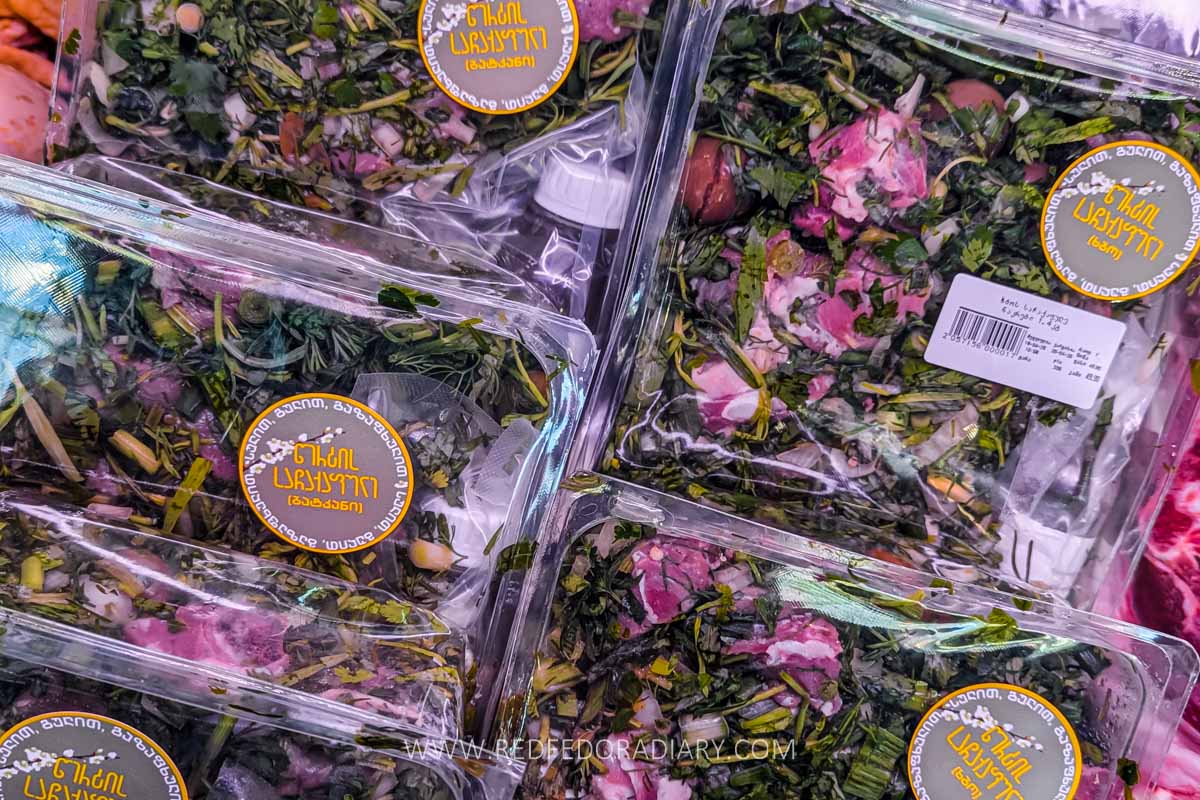
You don’t have to miss out on this if you are a vegetarian. We have mushroom Chaqapuli, too, and it’s as good as meat. Cafe Leila, a vegetarian restaurant in Tbilisi, serves it year-round.
Besides Chaqapuli, the Easter Georgian Supra meals vary from family to family. We usually have boiled ham, salads, one sort of Pkhali, and a few other appetizers.
Since tarragon is in season, we swap Khachapuri with tarragon and egg pie. And as with any traditional Supra, we drink wine, preferably red, at the dinner table.
Go to the cemetery on Monday
Since Easter marks the resurrection of Christ and symbolizes eternal life, Georgians observe it with the whole family, living or dead.
On Monday, we visit cemeteries to pay respect to the deceased family members and loved ones. Since traffic can be pretty harsh, many prefer to do that on Sunday instead.
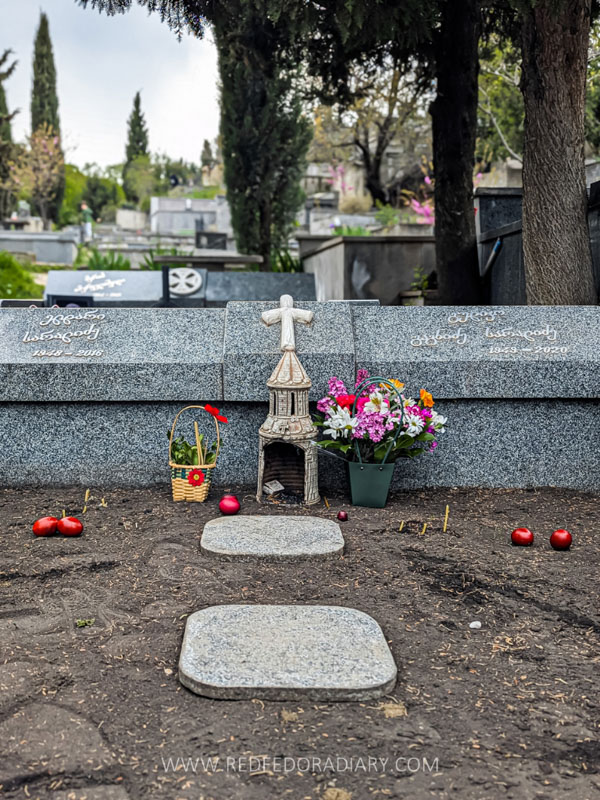
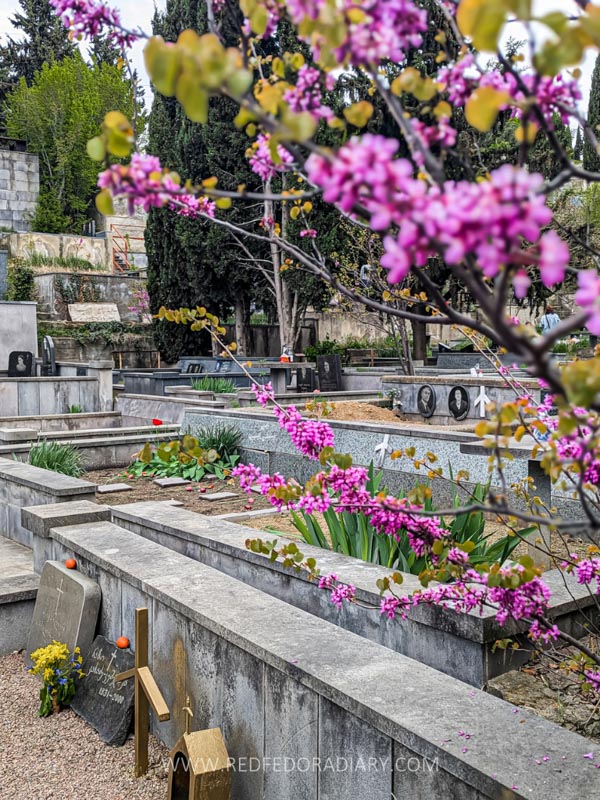
Going to the cemeteries has a sacred meaning for many. During Soviet rule, churches nationwide were closed, and locals couldn’t embrace Easter openly.
Therefore, people started to go to the cemeteries to pray, light a candle, and sit for a while. It became an alternative place to mark the holiday—and the custom stuck.
We go to the graveyards to “reunite” with departed family members, friends, and loved ones. That’s why you won’t see many sad faces at cemeteries during Easter.
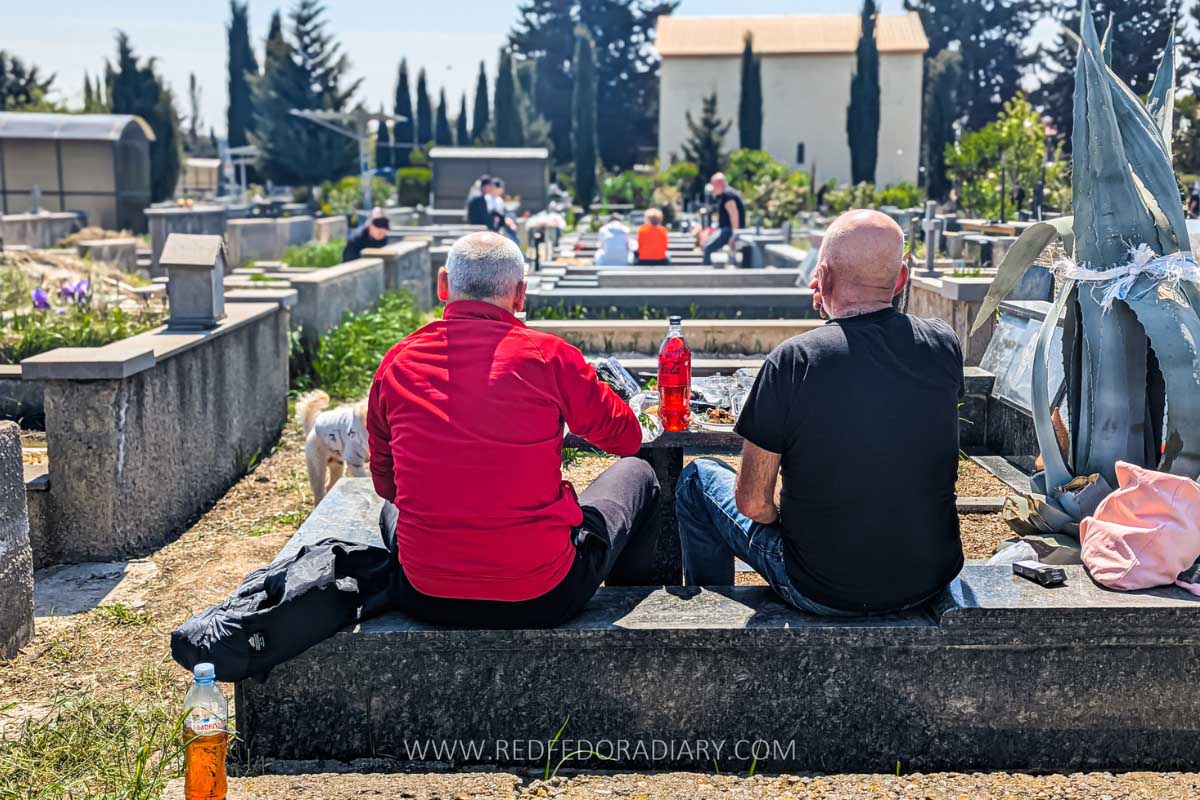
We bring eggs, Paska, candles, and a small bottle of wine to spend some time and remember them. It is customary to toast for dead relatives, and since you can’t drink wine on an empty stomach, there are snacks to nibble on.
After lighting candles and setting up the small Supra, one red egg is gently rolled across the grave three times—symbolizing the stone being rolled away from Christ’s tomb.
Pouring a small portion of wine on the grave is also customary. We call it “knocking over a goblet.” With this action, we believe that our deceased relatives are not alone in the afterlife and hope that our family members will also come to visit our graves when the time comes.
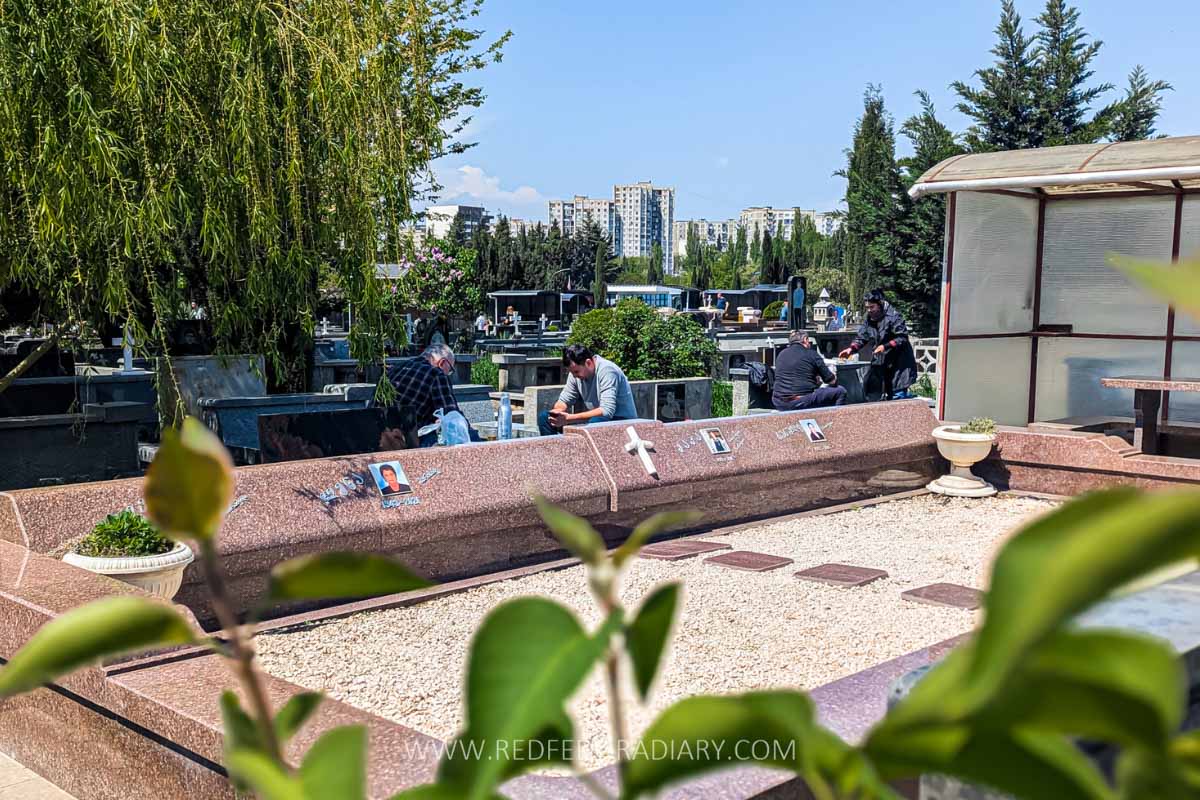
Sadly, some people take this tradition to a whole new level and make an excuse for heavy drinking that looks like a party rather than a simple religious or customary gesture.
If you are curious about the traditions and customs, you can visit one of the cemeteries in Tbilisi and the rest of the country. Most locals won’t mind it; in fact, they will most likely invite you and offer a glass of wine and food.
If you decide to go, remember to be respectful and mindful and ask permission before taking photos.
Have a memorable Easter in Georgia with a local family
Although I’ve mentioned it above, the easiest way for you to have a truly remarkable and special Georgian Easter is by joining my friends and partners at Eat This! Tours for a one-of-a-kind countryside experience.
Spend the day with a local winemaking family near Gori, participate in rituals and customs like toasting to ancestors at the cemetery, crack red eggs, and share a massive home-cooked Georgian Supra full of spring produce.
There’s even a chance to see Qvevri opening and tasting the new wine of the latest harvest. If this sounds like something you’d enjoy, check out their website for details and use code RFD5 for 5% off the tour.


I just heard you on the Tbilisi podcast. Thank you for all the information!
If I want to attend Litonioba and see the delegation with the Holy Fire from Jerusalem, what time should I go to the Cathedral? Do I need to be inside, or will I get a glimpse of it outside the church as well?
Hi Uzi, so sorry for my late response. Bringing fire to the churches depends on when it will be transported to Georgia. It will be very late in the night/early morning. Unfortunately, I never waited for that so I am afraid I can’t tell you if you can have a glimpse at it from the outside. I assume you can.